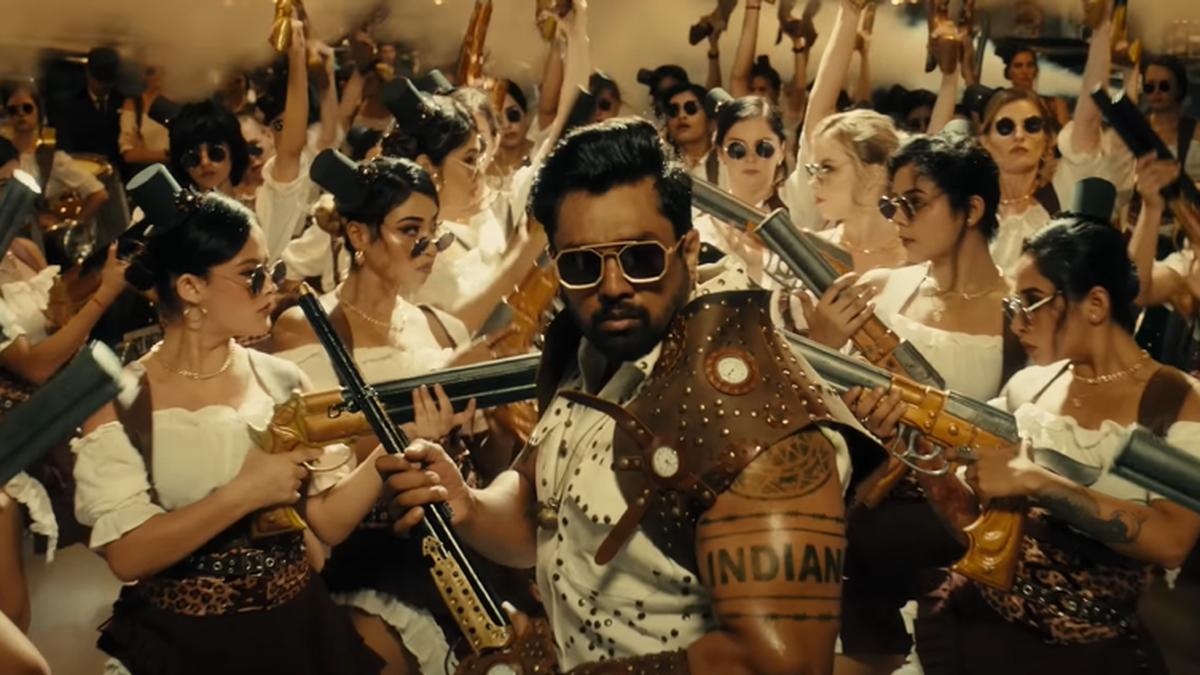
In an unexpected turn of events, the release of the Kannada film “Martin,” featuring Dhruva Sarja, has sparked a contentious debate between the film’s production team and the YouTube reviewing community. The film, which debuted on October 11, 2024, has received a mixed reception from audiences and critics alike, igniting a fierce battle over creative criticism and copyright claims.
The movie, helmed by director AP Arjun, has been lauded for its ambitious action sequences yet criticized for its portrayal of the lead character, executed by Dhruva Sarja, as excessively loud and exaggerated. While its initial release during the festive Dasara weekend promised a strong showing at the box office, the aftermath has been marred by a clash with digital reviewers, most notably on YouTube.
Among those entangled in the controversy is Anmol Jamwal, a renowned reviewer on the platform Tried & Refused Productions, which boasts over a million subscribers. Jamwal, who is known for his forthright film critiques, was forced to remove his negative review, titled “Worst film of 2024,” following a demand from a company representing the “Martin” filmmakers. The threat of a copyright strike loomed unless he complied with the request to take down his video.
“I felt this action was nothing short of bullying,” Jamwal shared with The Hindu, elaborating on his decision to comply to avoid further complications. “In all my years of reviewing films since 2015, I’ve never encountered such a situation,” he lamented, expressing his disillusionment with the apparent stifling of free criticism.
Uday K Mehta, the film’s producer, countered these accusations by underscoring his responsibility to protect “Martin” from harmful attacks. Emphasizing his legal right to act, Mehta revealed obtaining a John Doe order, enabling him to take legal measures against reviews potentially damaging the film’s commercial interests. “It’s my duty to safeguard my movie,” Mehta asserted, defending the stringent actions taken against negative online reviews.
The robust retaliation by the production team has drawn criticism from YouTube reviewers worldwide, including Shan Prasher, a Canadian of significant repute on the reviewing scene.
. Prasher, whose review also faced a disabling copyright strike, condemned the “Martin” team for disregarding appropriate “YouTube etiquette.” Per YouTube’s official guidelines, content creators should be warned prior to the issuance of a copyright strike, a step omitted in this instance according to Prasher. “This is an abuse of the system and an infringement on freedom of expression,” he decried, revealing that he responded with a counter-notification.
While Uday Mehta suggested that the criticism stemmed from jealousy and personal vendettas, other voices in the reviewing community, like Sudhakar Gowda of the Kannada channel “Srushti Entertainers,” have reported receiving threatening calls from Dhruva Sarja’s fans after offering less than favorable reviews. Gowda, exercising his right to personal opinion, insisted that he has every reason to critique a film he paid to watch.
Director AP Arjun has been quick to clarify that the animosity is not directed at reviewers per se but at what he perceives as “paid reviews” damaging the industry. Citing a similar controversy in the Malayalam film scene, Arjun questioned the objectivity and quality of criticisms, urging content creators to develop insightful analyses instead of resorting to uninformed discourse that undermines years of hard work and significant financial investments.
Another poignant perspective is offered by seasoned Kannada YouTube critic Kairam Vaashi, who acknowledges the filmmakers’ perspective but advises against excessive exertion of power against creators. He advocated for a balanced approach where constructive criticism is encouraged, leaving the more derisive “roasts” behind. “Responsible reviews can aid filmmaking as an art form,” he emphasized, identifying a delicate space where critique does not overstep into detrimental territory.
As the “Martin” controversy unfolds, this escalating conflict underscores the need for a middle ground—the creation of a consensus that harmonizes creative feedback with respectful discourse. While some argue for cinematic teams to embrace critique more openly, others suggest a greater understanding of the legal and ethical boundaries of content creation and review. The case continues to stir discussions on the evolving dynamics between filmmakers and digital creators, signaling a transformative period for how films might be critiqued and viewed in the digital age.












